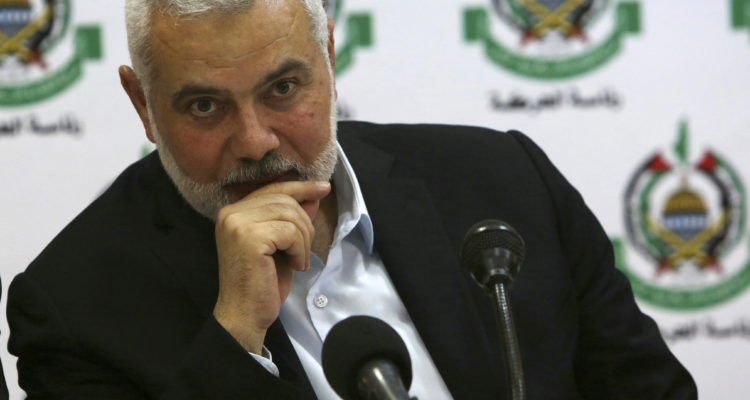The 61-year-old Ismail Haniyeh was raised in the Shati refugee camp in northern Gaza and died with an estimated $4 billion personal fortune.
By Baruch Yedid, TPS
In the early hours of Wednesday morning, a missile strike attributed to Israel struck a Tehran guest house killing Ismail Haniyeh, the head of Hamas’s politburo and number one leader.
Haniyeh’s assassination came hours after Israel claimed responsibility for a Beirut airstrike that killed Fuad Shakr, the highest-ranking Hezbollah figure killed since October 7.
Although Israel has not confirmed responsibility, Israelis praised the assassination.
“Eliminating the heads of the snake is an action that supports the existential need to defeat our enemies and strengthen Israel’s deterrence power,” Hila Baruch Lilian, a Sderot resident told The Press Service of Israel.
Lilian who is also a representative of the Otef Israel Forum of residents of communities surrounding Gaza, added, “As residents of [Gaza border communities], we support this offensive spirit, and call on the military and government leaders to continue with this strength relentlessly, until the captives are returned and security is restored to our borders.”
Who Was Haniyeh?
The 61-year-old Haniyeh was raised in the Shati refugee camp when Gaza was administered by Egypt. He died with an estimated $4 billion personal fortune.
During his youth, he worked in Israel as a plasterer. He became active with Hamas when it was founded in 1987, being involved with the “Islamic Wall,” Hamas’s student initiative at Islamic University in Gaza City.
Haniyeh was jailed several times in Israel, but his activities continued, leading to his deportation along with 415 other Hamas figures to Lebanon in 1992.
Haniyeh and the deportees returned to Gaza more than one year later.
Haniyeh’s big break came in 1997 when he was appointed personal assistant to Hamas founder and spiritual leader Sheikh Ahmed Yassin.
During the Second Intifada from 2000-2005, more than 1,000 Israelis were killed in suicide bombings, shootings and stabbing attacks.
Since launching its first Qassem rocket in 2001 at Kibbutz Saad, Hamas has fired thousands of rockets at Israel.
By 2005, Haniyeh was at the forefront of Hamas’s political efforts. In 2006, Hamas’s “Change and Reform” list won 44% of the seats in elections for the Palestinian Legislative Council.
In 2006-2007, he served as Palestinian Prime Minister under Mahmoud Abbas, but Western countries boycotted him.
In 2007, Hamas violently seized control of the Gaza Strip and Haniyeh became Hamas’s “Prime Minister” of Gaza, a title he held until 2014.
In 2017, he was elected leader of Hamas’s politburo, replacing Khaled Mashaal as the terror group’s top leader.
In his later years, Haniyeh based himself in Qatar and Turkey. Egypt — angered by Haniyeh attending the Tehran funeral of Islamic Revolutionary Guard Corps commander Qassem Solemeini in 2020 — refused to allow him to return to Gaza.
Haniyeh’s leadership was weakened by divisions within Hamas’s Qatar and Iran camps.
Haniyeh’s deputy, Saleh Arouri actively moved Hamas into Iran’s orbit and also established a Hamas presence in southern Lebanon.
Although Haniyeh was the face of Hamas for Qatari-mediated ceasefire talks, he continued embracing Iran, Hezbollah and Palestinian Islamic Jihad, and his rhetoric remained inflammatory.
Discussing the war with Al Jazeera on October 26, Haniyeh praised the deaths of Palestinian civilians.
“As I said, and I repeat every time, the blood of the children, women, and elderly – I do not say that it shouts out to you, but rather we need this blood so that it will ignite within us the spirit of revolution, so that it will arouse within us persistence, so that it will arouse within us defiance and advance,” Haniyeh said.
Haniyeh’s influence over Hamas collapsed with the October 7 attacks, which entrenched Yahya Sinwar and Arouri.
Hamas leaders inside and outside the Strip disagreed on ceasefire efforts and Hamas’s role in post-war Gaza.
Haniyeh’s three sons were killed in an Israeli airstrike in Gaza in April.
At least 1,200 people were killed, and 252 Israelis and foreigners were taken hostage in Hamas’s attacks on Israeli communities near the Gaza border on October 7. Of the 115 remaining hostages, 39 have been declared dead.
Hamas has also been holding captive two Israeli civilians since 2014 and 2015, and the bodies of two soldiers killed in 2014.





